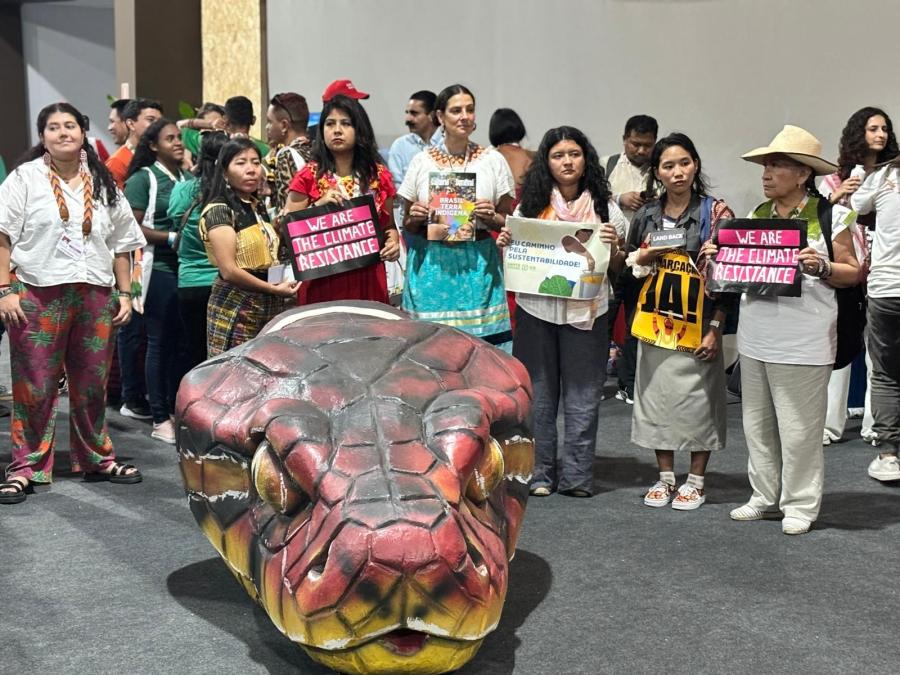The Kayapó Bring Their Case to the United States
From 27 to 31 January 1988, the Florida Rain-forest Alliance, along with numerous other organizations, sponsored a symposium titled "Tropical Rainforests: Strategies for Wise Management" in Miami. The organizers invited two Kayapó Indian leaders from Brazil, Paulinho Paiakan and Kube-i Kayapó, to speak about how Amazonian Indians conserve and manage tropical resources. The two leaders had been suggested to the committee by Dr. Darrell Posey, an ethnobiologist with 12 years of experience studying natural resource management by indigenous peoples. Dr. Posey accompanied the two leaders to Miami to act as interpreter.
At the symposium, the Kayapó spoke with eloquence about the importance of tropical forests and rivers to their lives and voiced their profound concern at the alarming increase in deforestation, mining, lumbering, water pollution and large-scale development projects. Specifically, they mentioned the enormous hydroelectric dam projects - such as the Altamira-Xingu River complex that at a cost of $10.6 billion would flood 7.6 million hectares of land - 85 percent of which would be Indian lands. They also spoke of other recent projects, such as those that affected the Parakanan and Waiami-Atroari Indians. Since the Xingu complex of dams in much larger than either of those dams, the Kayapó were extremely concerned that the nine neighboring Indian groups in the Xingu River Basin would suffer and die as a result.
Present at the symposium were Barbara Bramble (National Wildlife Federation) and Bruce Rich (Environmental Defense Fund), who suggested to the Kayapó leaders that they go to Washington, DC, to plead their case directly to the World Bank and to those members of Congress who influence US policy toward the Bank. The Kayapó accepted the invitation and traveled to Washington at the expense of NWF and EDF. They repeated their concerns to leaders to Congress, the State and Treasury Departments, and four executive directors of the World Bank. Their itineraries were arranged by NWF and EDF.
Upon returning to Brazil, the two Kayapó and Dr. Posy were threatened with criminal action for having "criticized Brazilian Indian policy, denigrating the country's image abroad " by the Brazilian Federal Authorities. all three could be prosecuted under a special set of laws, dating from Brazil's military dictatorship, that govern the activities of foreigners within Brazil and specifically prohibit "foreigners" from becoming involved in internal political issues or questions of national interest. If prosecuted and found guilty, the two Kayapó and Dr. Posey could serve one to three years in prison and then be expelled from the country. This is the first time that Indians have ever been prosecuted as "foreigners" in 500 year of "White Man's" law in Brazil.
The case has caused enormous repercussions both within Brazil and worldwide. The federal prosecutor has made the charges very specific - for example, criticisms by the Indians and Dr. Posey of the Altamira-Xingu River Hydroelectric loans to Brazil have delayed the loans, thereby provoking a national economic crisis.
Both Posey and Paiakan have given statements to the court beginning on 26 August. Kube-i has refused to appear in court until other Indian leaders from Brazil accompany him. Conservation, scientific, human rights and Indian groups are organizing to give solidarity to the three defendants More help is needed, however.
Contributions to the Kayapó Fund to help pay for legal expenses of the Kayapó and the travel expenses of hundreds of other Indians in support of the Kayapó at the next hearing can be sent to Cultural Survival, 11 Divinity Avenue, Cambridge, MA 02138. All contributions are tax deductible to the extent allowed by law.
Article copyright Cultural Survival, Inc.



